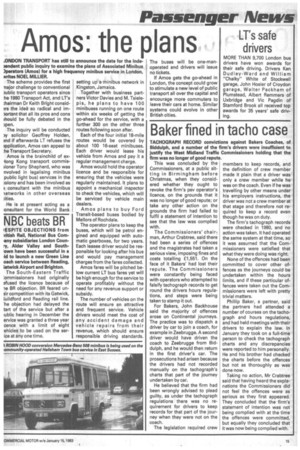Baker fined in tacho case
Page 17

If you've noticed an error in this article please click here to report it so we can fix it.
TACHOGRAPH RECORD convictions against Bakers Coaches, of Biddulph, and a number of the firm's drivers were insufficient to justify the West Midland Traffic Commissioners holding that the firm was no longer of good repute.
This was concluded by the Commissioners, at a public sitting in Birmingham before Christmas, when they considered whether they ought to revoke the firm's psv operator's licence, on the grounds that it was no longer of good repute; or take any other action on the grounds the firm had failed to fulfil a statement of intention to see that the law was complied with.
The Commissioners' chair: man, Arthur Crabtree, said there had been a series of offences and the magistrates had taken a serious view, imposing fines and costs totalling £1,551. On the face. of it Bakers' had lost their repute. The Commissioners were constantly being faced with operators who attempted to falsify tachograph records to get round the drivers hours regulations, and steps were being taken to stamp it out.
For Bakers, John Backhouse said the majority of offences arose on Continental journeys. The practice was to dispatch a driver by car to join a coach, for example in Zeebrugge. A second driver would have driven the coach to Zeebrugge from Biddulph, and he would then return in the first driver's car. The prosecutions had arisen because the drivers had not recorded manually on the tachograph's charts that part of the journey undertaken by car.
He believed that the firm had been wrongly advised to plead guilty, as under the tachograph regulations there was no requirement for drivers to keep records for that part of the journey when they were not on the coach.
The legislation required crew members to keep records, and the definition of crew member made it plain that a driver was only a crew member while he was on the coach. Even if he was travelling by other means under his employers instructions, the driver was not a crew member at that stage and therefore not required to keep a record even though he was on duty.
The firm's tachograph records were checked in 1980, and no action was taken. It had operated the same system at that time, so it was assumed that the Commissioners were satisfied that what they were doing was right.
None of the offences had been committed to cover other offences as the journeys could be undertaken within the hours limits, and if these particular offences were taken out the Commissioners were left with pretty trivial matters.
Phillip Baker, a partner, said the partners had attended a number of courses on the tachograph and hours regulations, and had held meetings with their drivers to explain the law. In January they took on a full-time person to check the tachograph charts and any discrepancies were reported to him personally. He and his brother had checked the charts before the offences but not as thoroughly as was done now.
Taking no action, Mr Crabtree said that having heard the explanations the Commissioners did not feel the offences were as serious as they first appeared. They concluded that the firm's statement of intention was not being complied with at the time the offences were committed, but equally they concluded that it was now being complied with.








































































































